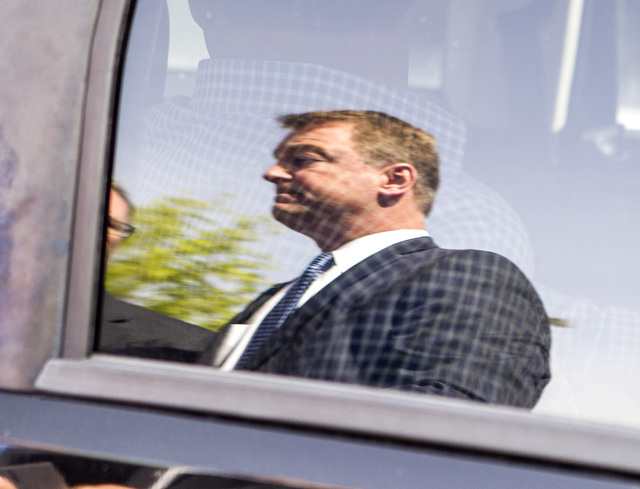
WASHINGTON — A scuffle over the guest list has added a last-minute twist to plans by a group of congressmen to visit Yucca Mountain, the once-touted Nevada site for nuclear waste now fenced off and empty after being terminated by President Barack Obama.
As a half dozen lawmakers and other federal officials prepared to arrive in Las Vegas in advance of the Thursday tour, Sen. Dean Heller stepped in to urge that the state of Nevada be allowed to send along one of its consultants.
Going to the top, Heller, R-Nev., lodged his request in a letter to Energy Secretary Ernest Moniz.
“Given that many of the congressional participants are traveling thousands of miles for this fact-finding visit, it would be a shame for those representatives to not receive a comprehensive briefing while in the state,” Heller wrote to Moniz on Tuesday.
Heller acted after Robert Halstead, executive director of the Nevada Agency for Nuclear Projects was told this week there was no more room on the tour. Rep. John Shimkus, R-Ill., tour leader and chairman of the House environment and the economy subcommittee, said the visit to be conducted by Energy Department personnel “was fully subscribed.”
The state had proposed to send along geology consultant Steve Frishman, a member of a Nevada technical and legal team that has built evidence it says shows that Yucca Mountain would be unsafe to store highly radioactive waste.
“It is my hope the department could accommodate one more participant who will serve a critical role in providing the visitors the State of Nevada’s perspective on the flaws with a proposed nuclear waste repository,” Heller told Moniz.
The last-minute tangle injected a new dose of Yucca Mountain politics on the eve of the tour. Six lawmakers including Reps. Cresent Hardy and Mark Amodei, both R-Nev., were scheduled to make the first publicized trip to Yucca Mountain by a congressional delegation since 2011.
The Obama administration terminated the Yucca project in 2010. Shimkus, a leading advocate of reviving the program, has said he was hopeful the trip would showcase the Nevada site after it received a promising safety review in recently completed studies by the staff of the Nuclear Regulatory Commission.
Yucca opponents charged the trip was designed more for political optics than for scientific inquiry, including a decision to exclude Frishman, a critic of the program. At the same time, pro-Yucca members of the local Nye County Commission who inquired about tagging along said they also were told they could not be accommodated.
While the Department of Energy arranged details of the tour, officials said it is customary for congressional sponsors to set the guest list.
DOE press secretary Aoife McCarthy said the department “has accommodated all requests for participants made by the subcommittee, including members of Congress, congressional and committee staff, and press.
“The department has not received a request from the subcommittee to include a participant representing the state of Nevada,” McCarthy said, adding DOE would attempt to make room for anyone else sent its way by the House panel.
About 30 people are expected on the tour, but it remained unclear whether Frishman would be added. When a Shimkus-led delegation last visited Yucca Mountain in 2011, Frishman was not on the tour.
Jordan Haverly, a spokesman for Shimkus, said the congressman was willing to meet with Frishman “as we move forward.”
“I think it’s important to note that DOE’s itinerary for the tour was carefully planned for the bipartisan delegation’s short visit, taking into consideration the members’ different arrival/departure times and travel to the remote site,” Haverly said in an email.
As part of the tour, DOE officials plan to helm a small group of ATVs to drive lawmakers into the 5-mile long exploratory tunnel that remains the defining feature of the Yucca site. The project once envisioned placing thousands of canisters of high-level nuclear waste into tunnel alcoves where they eventually would be buried.
Shimkus has said he is preparing new legislation to move Yucca Mountain forward and hoped to have it ready for votes by the summer.
In an interview with an Illinois newspaper published Wednesday as he departed for Nevada, Shimkus said he was encouraged by signs that Yucca Mountain might be getting a fresh look in the state.
“There’s an internal debate going on in the state of Nevada, and that’s promising,” he told the Champaign/Urbana News-Gazette.
With chief Yucca Mountain foe Sen Harry Reid preparing to retire, “what’s happening now in Nevada is that there’s a discussion occurring by some elected officials — not a lot of them, because they’re afraid, most people who want to run statewide are still anti (Yucca Mountain) — but there are a few people at least talking about it,” Shimkus said.
One of those is Hardy, who wrote an opinion article in the Las Vegas Review-Journal last month calling for an “honest discussion” with the federal government over Yucca Mountain, including a gauge of what benefits the state might obtain if the site were proved safe.
Hardy, in Carson City on Wednesday to make a scheduled address to the Legislature, was scheduled to meet with Halstead to discuss Yucca Mountain, the congressman’s office confirmed.
With Reid leaving, Heller has said he is prepared to take the reins as the leading voice in Congress against Yucca Mountain.
“Just like Chairman Shimkus doesn’t want the nuclear waste produced in Illinois sitting at power plants in that state, the citizens of Nevada are not interested in having the burden of hosting nuclear waste from Illinois, or any other state for that matter, in the Silver State,” Heller spokesman Neal Patel said.
“The people of Nevada refuse to allow nuclear waste to be stored in the state, especially since it does not have a nuclear plant of its own.”